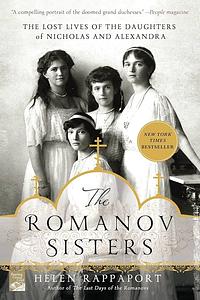Take a photo of a barcode or cover
I don't know why I read this - it was absolutely heartbreaking. Other than confirming my opinion that most people don't deserve to exist, this book weaved a beautiful, information-packed story revolving around the Romanov sisters. Helen does a wonderful job describing each sister's personality and how it affected people around them, but we also get to know their brother, Alexey, and their parents, Nicholas and Alexandra.
Their story is tragic but a story everyone should be familiar with. "We do not have the right to forget, nor to forgive ourselves for our passivity and failure to do something for them."
Their story is tragic but a story everyone should be familiar with. "We do not have the right to forget, nor to forgive ourselves for our passivity and failure to do something for them."
Such an interesting read, but I felt like the author was a bit too affectionate towards her subjects. I realize there are plenty of books about Tsar Nicholas, but it read to me like the Romanovs against the world without much discussion towards what was wrong with the Imperial family. It is worth reading, and don't let the supposed length scare you. Much of the book is pictures, index, etc. It's closer to around 360 pages of actual reading.
Very interesting to learn the true story of the Romanovs when I've heard is bits and pieces. The one complaint I have is the title of the book. It's just as much about Alexandra, Nicholas and Alexey as it is about the sisters, so I find it a bit misleading.
challenging
emotional
reflective
tense
medium-paced
challenging
informative
sad
slow-paced
It's difficult to review a work like this. It's not an easy read. 386 pages of text with over 100 pages of notes and bibliography, chock full of facts and information. There were some parts that were honestly hard to wade through. But I decided to base my star rating on the amount of work and documentation that Ms. Rappaport put into this volume. Don't misunderstand, I did thoroughly enjoy the book and her presentation of the family. It's just very detailed and parts of it are slow and dry.
This book begins with a tour of the Alexander Palace, long after Nicholas, Alexandra, and family were forced to leave in August of 1917. Visitors to the palace in 1929 commented that there was a feeling that they would be back at any moment, seeing the children's dining room still set with "monogrammed Romanov china ready for the next meal."
We then begin the story while Alix, one of four sisters, daughters of Princess Alice, second daughter of Queen Victoria, lived in southwestern Germany. Alix and her sisters were "princesses of the house of Hesse." Alix meets Nicholas Alexandrovich, the heir to the Russian throne, at a wedding, and he becomes stricken by her. Nicky (as he was called in this chapter) was, by the way, Alix's third cousin. One of the striking things I learned in this book was how it seems that so many of these Russian aristocrats were related to the house of Windsor in England, in some way. I found that to be interesting and odd.
Nicholas and Alexandra, as she became, eventually married and had four daughters, Olga, Tatiana, Maria, and Anastasia, before finally having a son to be heir to the throne. That son was Alexey, who turned out to be hemophiliac. All of their lives and adventures are given in quite great detail in this well-documented volume.
One of the most amazing things to me, in this book, was the love that this family had for one another. Alexandra was criticized heavily for not being more of an empress, as she spent much time being a mother and loving her children. Nicholas and Alexandra were perhaps more devoted to one another than any historical couple that I have read of. I find it interesting that the author chose 1 Corinthians 13:13 to be presented on the page before Chapter 1 begins. "So now faith, hope, and love abide, these three; but the greatest of these is love."
It's my opinion than Ms. Rappaport has done a magnificent job in presenting the information here. This is not her first book on the Romanovs. In The Last Days of the Romanovs: Tragedy at Ekaterinburg, she addresses the event of their murder, which is given about a paragraph in this volume. This book is about the lives of, primarily, the four daughters, who were remarkable young women. I am inspired by how they endured so much (yes, I know, it's hard to consider what rich people "endure," but they did) without so much as a complaint. During World War 1, they served as healthcare agents, learning how to treat wounded soldiers, along with their mother. In fact, Alexandra was even criticized for that work, because people felt that it wasn't "empress-like" for her to be dressing up as a nurse and tending to the wounded.
And when the family was torn from its home as Bolshevik revolutionaries took over Russia, and taken to Siberia, and then to Ekaterinburg, where they were ultimately murdered, they never uttered a complaint.
Oh, and lest I forget, I was also shocked at the close relationship that the family had with Grigory Rasputin, a somewhat self-styled faith healer. That was very interesting. But there are some extremely odd circumstances surrounding his involvement with the family and some pretty strange and miraculous healings that occurred. In fact, it could be said, I believe, that the murder of Rasputin, at one point, signaled the beginning of the end for the Romanovs.
I could write much more, but I won't. I was very impressed with this account of the family, the daughters, how remarkable they were, and the deep, deep love that this family had for each other.
I recommend this book for history lovers, especially anyone fascinated with this family. Oh, and, by the way, there was no mention whatsoever of any claims that Anastasia survived the murder event.
I will leave with this quote, from page 376: "But in the early hours of the morning of Wednesday, 17 July [1918], they were unexpectedly awoken by their captors and ordered to dress. Told that they were being moved downstairs for their safety from unrest and artillery fire in the city, they complied without question. In an orderly line Nicholas, Alexandra and their five children, Dr Botkin and their three loyal servants Demidova, Trupp and Kharitonov, walked quietly down the wooden stairs from their apartments, across the courtyard and into a dingy basement room. As they went, there were 'no tears, no sobs, and no questions.'"
This book begins with a tour of the Alexander Palace, long after Nicholas, Alexandra, and family were forced to leave in August of 1917. Visitors to the palace in 1929 commented that there was a feeling that they would be back at any moment, seeing the children's dining room still set with "monogrammed Romanov china ready for the next meal."
We then begin the story while Alix, one of four sisters, daughters of Princess Alice, second daughter of Queen Victoria, lived in southwestern Germany. Alix and her sisters were "princesses of the house of Hesse." Alix meets Nicholas Alexandrovich, the heir to the Russian throne, at a wedding, and he becomes stricken by her. Nicky (as he was called in this chapter) was, by the way, Alix's third cousin. One of the striking things I learned in this book was how it seems that so many of these Russian aristocrats were related to the house of Windsor in England, in some way. I found that to be interesting and odd.
Nicholas and Alexandra, as she became, eventually married and had four daughters, Olga, Tatiana, Maria, and Anastasia, before finally having a son to be heir to the throne. That son was Alexey, who turned out to be hemophiliac. All of their lives and adventures are given in quite great detail in this well-documented volume.
One of the most amazing things to me, in this book, was the love that this family had for one another. Alexandra was criticized heavily for not being more of an empress, as she spent much time being a mother and loving her children. Nicholas and Alexandra were perhaps more devoted to one another than any historical couple that I have read of. I find it interesting that the author chose 1 Corinthians 13:13 to be presented on the page before Chapter 1 begins. "So now faith, hope, and love abide, these three; but the greatest of these is love."
It's my opinion than Ms. Rappaport has done a magnificent job in presenting the information here. This is not her first book on the Romanovs. In The Last Days of the Romanovs: Tragedy at Ekaterinburg, she addresses the event of their murder, which is given about a paragraph in this volume. This book is about the lives of, primarily, the four daughters, who were remarkable young women. I am inspired by how they endured so much (yes, I know, it's hard to consider what rich people "endure," but they did) without so much as a complaint. During World War 1, they served as healthcare agents, learning how to treat wounded soldiers, along with their mother. In fact, Alexandra was even criticized for that work, because people felt that it wasn't "empress-like" for her to be dressing up as a nurse and tending to the wounded.
And when the family was torn from its home as Bolshevik revolutionaries took over Russia, and taken to Siberia, and then to Ekaterinburg, where they were ultimately murdered, they never uttered a complaint.
Oh, and lest I forget, I was also shocked at the close relationship that the family had with Grigory Rasputin, a somewhat self-styled faith healer. That was very interesting. But there are some extremely odd circumstances surrounding his involvement with the family and some pretty strange and miraculous healings that occurred. In fact, it could be said, I believe, that the murder of Rasputin, at one point, signaled the beginning of the end for the Romanovs.
I could write much more, but I won't. I was very impressed with this account of the family, the daughters, how remarkable they were, and the deep, deep love that this family had for each other.
I recommend this book for history lovers, especially anyone fascinated with this family. Oh, and, by the way, there was no mention whatsoever of any claims that Anastasia survived the murder event.
I will leave with this quote, from page 376: "But in the early hours of the morning of Wednesday, 17 July [1918], they were unexpectedly awoken by their captors and ordered to dress. Told that they were being moved downstairs for their safety from unrest and artillery fire in the city, they complied without question. In an orderly line Nicholas, Alexandra and their five children, Dr Botkin and their three loyal servants Demidova, Trupp and Kharitonov, walked quietly down the wooden stairs from their apartments, across the courtyard and into a dingy basement room. As they went, there were 'no tears, no sobs, and no questions.'"
Great story telling of real lives. Reads like fiction. This is how history books should be written.
A very engaging listen with a big focus on the Romanov daughters. This is probably the most flattering portrayal of Alexandra. Unfortunately, the book sometimes gets bogged down by the repetitiveness of the girls' lives. Being so sheltered with almost no friends other than each other, their family life consists of a lot of the same: tea with Aunt Olga, trips aboard the Standart, summer at Livadia, etc. You definitely learn more about the girls' personalities, especially the two oldest.




